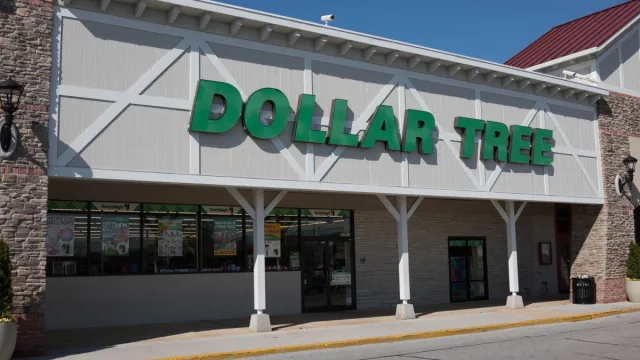Dollar Tree Is Raising Some Prices to $7 in “Next Exciting Chapter”

While retailers like Family Dollar and Dollar General already sell most items for more than $1, Dollar Tree still delivers a majority of items around that price point. There have certainly been price hikes in recent years, including a move to the $1.25 base price, the introduction of higher-priced frozen and refrigerated sections, and the launch of the Dollar Tree Plus line—but shoppers have taken comfort in the knowledge that prices don’t go beyond $5. Now, however, Dollar Tree is raising prices yet again, increasing its price ceiling to $7.
RELATED: Dollar Tree Shoppers Find 8 Luxury Brands for Just $1.25: “Hit the Jackpot.”
During a March 13 earnings call with investors, Dollar Tree CEO Rick Dreiling announced that shoppers will soon see more expensive items on shelves.
“This year, across 3,000 stores, we expect to expand our multi-price assortment by over 300 items at price points ranging from $1.50 to $7,” Dreiling said on the call. According to the CEO, this will allow the store to introduce a “wider range of choices across a variety of categories,” including food, pet supplies, and personal care products.
“Over time, you will also see us fully integrate multi-price merchandise more into our stores so our shoppers will find $5 bags of dog food next to our traditional $1.25 pet treats and toys, and our $3 bags of candy will be found in the candy aisle,” Dreiling said. “This is the next exciting chapter of the Dollar Tree value story: new items, more choices, and more savings.”
However, while Dollar Tree will continue introducing new inventory as part of its “multi-price expansion strategy,” it’s not abandoning that $1.25 price point altogether. Allaying those fears, Dreiling clarified that the “vast majority” of products will “remain at our entry-level fixed price point” ($1.25) during the earnings call.
Best Life reached out to Dollar Tree for comment on the new pricing structure, and will update the story when we hear back.
RELATED: These Are the Products You “Need to Stop Buying” at Dollar Tree, Shopper Says.
Customers have already noticed some warning signs of price increases, including new price scanners in Dollar Tree stores. On TikTok, shoppers posted videos of the the devices, which are convenient at other stores, but seem counterintuitive at Dollar Tree, where items are typically all the same low price.
“I shouldn’t have to check the price at the DOLLAR store,” a comment on a Feb. 12 TikTok reads.
Another alleged that Dollar Tree is going to be “the new Five Below” thanks to the higher price points. (Five Below markets its inventory as being below $5, but it also has a section for more expensive products.)
While many shoppers are frustrated by these pricing changes, Dollar Tree, which owns Familly Dollar, is actually facing some financial difficulties.
Also on March 13, the company announced a net loss of $1.71 billion for the fourth quarter, while also falling short of sales estimates. This is a stark contrast to the same period last year, when Dollar Tree saw a profit of $452.2 million.
As a result, Dreiling told investors on the earnings call that the company would close approximately 600 Family Dollar stores in the first half of this year. An additional 370 Family Dollar Stores and 30 Dollar Tree stores will also close “at the end of each store’s current lease term,” Dreiling said.
“We believe rationalizing these unprofitable locations will help to unlock meaningful value at the enterprise level,” he continued.